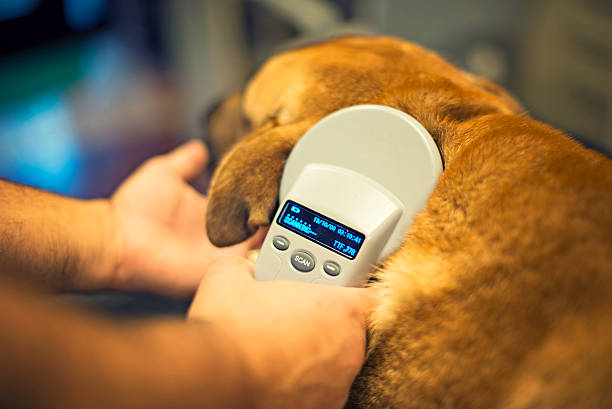When it comes to dogs, they may not understand our language and sometimes, we may find it difficult to interpret their way of communication. Dogs convey signs of sickness or discomfort through their body language. This article will aid you in interpreting different signals your dog may use to show that they are not feeling well. It’s essential to be aware of the signs to watch out for.


Some of the signs that your dog is trying to tell you something include:
- Shaking off (as if they’ve just come out of water) or trembling.
- Whining when you move, touch them, or pick them up.
- Cowering and turning away from you.
- Not eating and/or drinking as much compared to usual.
- Hiding from the family, spending more time on their own, or not wanting to go for walks.
- Licking a specific area of their body excessively because they may have an open wound or sore there.
- Curling up into a ball and laying very still.
- Not wanting to be touched or held as much.
- Grooming excessively, which can indicate they have fleas or another skin condition.
- A noticeable change in general behaviour includes not being themselves and acting differently from how they normally do.
Some of these signs can also indicate other illnesses, and so if you notice your dog has a number of them or any of the above symptoms, it’s best to take them to the vet as soon as possible for a check-up. With some conditions, early detection is critical to ensure proper treatment.


Will my dog always show the same types of symptoms when they’re not feeling well?
No, dogs will not always show the same types of symptoms when they’re not feeling well. You should observe your dog’s behaviour to see if there are any changes in how they act. This will help you determine if something is wrong with them.
What are some common symptoms that my dog will show me if they’re sick, but not necessarily something serious?
Here are some examples of some symptoms that are less serious:
1. Dogs will often have a decreased appetite when they’re sick. It’s a good idea to take them to the vet if they stop eating completely because there can be many reasons why they lost their appetite. This symptom is common in dogs that feel sick, but some other possible reasons are that the dog isn’t hungry or that the food tastes bad.
2. Dogs may experience vomiting and diarrhoea when they’re not feeling well. Vomiting is a common symptom if your dog has an upset stomach or ate something that did not agree with them. Diarrhoea is also prevalent when your dog may have eaten something that upset their stomach or if they have a parasite.
3. Dogs will often appear lethargic when they’re sick. You’ll notice that your dog will act much less active than usual and might not even want to leave the house with you. Sometimes this symptom can be confused with them being in a bad mood.


4. Dogs will often have sore and itchy skin when they’re sick. This symptom is prevalent in dogs with an allergic reaction to something such as food or plants. Your dog may also be rubbing up against things to try to relieve the itchiness. You’ll notice redness, irritation, hair loss, and scabbing around the affected area.
5. Dogs will often have a fever when they’re sick, especially in dogs with an infection or parasite. In mild cases, you won’t notice anything but your dog’s body temperature being slightly higher than normal. However, if your dog has a high fever, there can be many symptoms that accompany it, such as shivering, lack of appetite, lethargy, vomiting and diarrhoea. Please take your dog to the veterinarian immediately if you suspect they have a fever.
6. Dogs will often get hives when they’re sick. You’ll notice that the skin on your dog’s body will be red and swollen in these areas. The most common places for hives to occur is on the face, feet, and armpits. In some cases, however, it can be a sign of an allergic reaction or parasitic infection. If this happens, you should take your dog to the veterinarian.
7. Dogs will often experience difficulty breathing when they’re sick. You’ll notice that they may start panting excessively or try to sit down a lot. This symptom is widespread in dogs with asthma, and it can be triggered by dust, grass or pollen allergies, exercise, hot temperatures, excitement, stress and more.


8. Dogs will often cough when they’re sick. You’ll notice that your dog will start coughing when they breathe in air. This symptom is widespread in dogs with a respiratory infection like kennel cough or the flu. Some other possible reasons could be allergies, asthma, parasites, a collapsed trachea, or lung cancer.
9. Dogs will often drool when they’re sick. You’ll notice that your dog may start drooling excessively more than usual for no apparent reason. There are many possible reasons for excessive drooling, and the best thing to do if this happens is to take your dog to the veterinarian as soon as possible. Some other possible reasons could be heatstroke, Addison’s disease, distemper, allergies, neurological problems, and more.
10. Dogs will often have seizures when they’re sick. You’ll notice that your dog will start acting in a bizarre manner, such as wandering or barking non-stop. This is especially common in dogs with epilepsy and can be triggered by stress, infections, toxins, high temperatures, and more.
11. Dogs will often limp when they’re sick. You’ll notice that your dog won’t be able to put weight on one of its legs and will drag it while walking. This symptom is prevalent in dogs with broken bones or arthritis. Dogs may also limp if they’re experiencing pain in the affected area.


12. Dogs will often look around in circles when they’re sick. You’ll notice that your dog’s head might start turning to the side and then turn forward again as if they’re trying to spot something. This is especially common in dogs with head injuries or brain diseases such as rabies and meningitis.
13. Dogs will often look away when they’re sick. You’ll notice that your dog’s eyes will start looking away from whatever it is you’re pointing at them, and their pupils might shift around. This is especially common in dogs with head injuries or brain diseases such as rabies and meningitis.
14. Dogs will often shake their heads when they’re sick. You’ll notice that your dog’s head might start shaking periodically whenever you touch them or get too close to the eyes. This symptom is widespread in dogs with ear infections, head injuries, and brain diseases like rabies.
15. Dogs will often be overly sensitive when they’re sick. You’ll notice that your dog may start avoiding eye contact, whimpering, backing away, and acting in a fearful manner whenever you try to touch them or approach them. This is especially common in dogs with neurological problems such as rabies or epilepsy.
16. Dogs will often act hyper when they’re sick. You’ll notice that your dog’s heart rate and respiratory rate may increase and it may start pacing around the house non-stop for no apparent reason. Some other possible symptoms are excessive panting, vomiting, diarrhoea, loss of bladder/bowel control, and more.
17. Dogs will often act lethargic when they’re sick. You’ll notice that your dog may start sitting around all day and won’t be interested in going for a walk or playing with their toys anymore. Some other possible symptoms are a loss of appetite, drooling excessively, vomiting, and more.


Conclusion
If your dog is showing more than one sign of sickness or discomfort, it would be wise to contact a veterinarian for a thorough check-up.
A common scenario where owners will have some uncertainty about their pet’s health is an illness that causes multiple symptoms over the course of days or weeks. In this case, it isn’t easy to diagnose without tests. Many veterinarians will recommend an abdominoplasty (examining under the fold of the animal) as a core piece of any physical examination.


